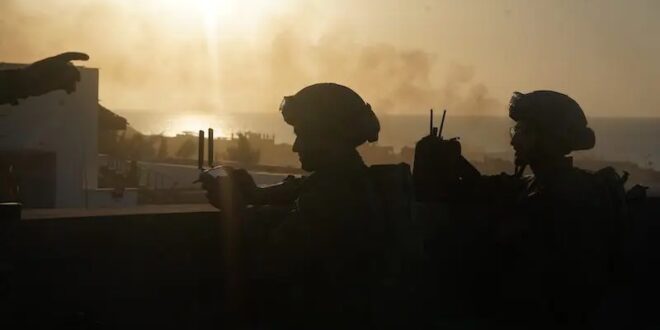The United Nations says about 110,000 people have fled the southern Gaza city of Rafah as of Friday amid fighting between Israeli forces and Hamas militants, along with Israeli bombardments that have stepped up in and around the city.
Meanwhile, cease-fire talks brokered by Qatar and Egypt have apparently stalled. A senior Israeli official told The Washington Post late Thursday the latest round of indirect negotiations in Cairo had ended, and Israel would proceed with its operation in Rafah and other parts of the Gaza Strip as planned.
While a full-scale invasion of Rafah does not appear to be imminent, the more limited incursion launched earlier this week is continuing.
Rafah on ‘knife’s edge’
Speaking Friday at U.N. headquarters in New York, U.N. Secretary-General Antonio Guterres again appealed to both Israel and the leadership of Hamas to “demonstrate political courage and spare no effort to reach an agreement to stop the bloodshed and to free the hostages.”
He described the situation in Rafah as being “on a knife’s edge” as airstrikes continued throughout southern Gaza. More than 1 million Palestinians, half of whom are children, have crowded into the Rafah governorate for shelter.
At a news briefing earlier Friday, the head of the U.N. Gaza Office for the Coordination of Humanitarian Affairs, or OCHA, Georgios Petropoulos, said the fighting surrounding Rafah is exacerbating the humanitarian crisis in Gaza.
Speaking remotely, Petropoulos said all crossings into the Rafah area in southern Gaza are closed, preventing movement of supplies, humanitarian staff or any civilians needing to evacuate. He said even if the Rafah crossing was open, the nearby fighting would make it too dangerous to use.
The OCHA chief said unless there is a solution quickly, humanitarian activities will come to a halt in Gaza “within the next two days.”
The Gaza Health Ministry said Friday that 34,654 Palestinians have been killed and 77,908 injured since Israel’s military offensive on Gaza began in October after the Hamas terror attack on October 7.
Netanyahu says Israel ready to ‘stand alone’
The White House Thursday again warned Israel against expanding its limited operation into an all-out assault on Rafah, this time not only for long-held humanitarian concerns but for strategic calculations.
National Security Council spokesperson John Kirby told reporters, “Our view is that Rafah operations, certainly any kind of major Rafah ground operation, would actually strengthen Hamas’ hands at the negotiating table, not Israel’s.”
Kirby said that Yahya Sinwar, the Hamas leader believed to be hiding in the network of tunnels in Gaza, would have “less incentive to want to come to the negotiating table” if there were massive new civilian casualties in Rafah.
But Israeli Prime Minister Benjamin Netanyahu remained defiant, saying Israel is prepared to “stand alone” against its enemies. In a later interview on U.S. television, Netanyahu said he hoped that he and Biden could overcome their disagreements.
Netanyahu ordered Israeli forces to carry out a “limited operation” in eastern Rafah earlier this week after rejecting a proposed cease-fire deal that Hamas said it had agreed to. The deal would have provided a temporary pause in hostilities paired with the release of hostages held by Hamas in exchange for Palestinians detained in Israeli jails.
State Department spokesperson Matthew Miller told reporters Thursday that negotiators are still working to make changes to Hamas’ counterproposal, but finalizing the agreement’s text was an “incredibly difficult” process.
Israeli Foreign Minister Israel Katz said Thursday that his country’s military “will continue to fight Hamas until its destruction.”
 Eurasia Press & News
Eurasia Press & News




